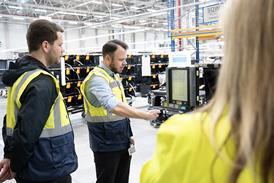 Volkswagen has had to cut shifts at its Wolfsburg and Emden facilities due to a shortage of engines and other parts, while BMW, Porsche and Mercedes-Benz are each facing their own part supply problems. Across Europe, there is a wholesale shortage of electronic components for automotive production. It would appear that the desire to fulfil rising demand for German cars in China and the United States has over-stretched the European OEMs’ supply chains.
Volkswagen has had to cut shifts at its Wolfsburg and Emden facilities due to a shortage of engines and other parts, while BMW, Porsche and Mercedes-Benz are each facing their own part supply problems. Across Europe, there is a wholesale shortage of electronic components for automotive production. It would appear that the desire to fulfil rising demand for German cars in China and the United States has over-stretched the European OEMs’ supply chains.
The story is much the same on the other side of the Atlantic. Ford has had to temporarily stop production at its Dearborn Truck plant due to a lack of engine components, while Chrysler has had to halt production of two new minivan models at its Windsor, Ontario facility due to a shortage of body parts.
The situation is a double-edged sword. While the need to increase output in order to match market demand can serve to demonstrate the relative strength of the automotive industry, it also highlights inherent weaknesses in the supply chain. As OEMs look to ramp up output, suppliers are required to deliver an increased number of parts, but with little investment cash available to underwrite the increased volumes, there will inevitably be production stoppages related to part shortages.
The underlying problems behind such shortfalls are two-fold. The contracting market during the recession caused suppliers to scale back output in parity with their customers. More than most, these companies could illafford to have liquidity tied up in unsold product. Those that cut output in line with OEM production stood the best chance of staying in business, but across the supply spectrum, companies unable to pay their own supplier invoices declared bankruptcy. The strongest remained, but capacity was reduced.
Those companies still in business could be accused of not accurately predicting just how strongly - and how rapidly - the market would return, but this would be unfair. After such a precipitous drop, it would take nerves of steel to start investing in new capacity for what could be viewed as a short-term market ‘bounce’. The banks surely lack sufficient nerve, as the credit to underwrite needed expansion still remains largely unavailable.
While most automotive markets contracted, Brazil was one of the few areas where there was sustained market growth. In a case similar to those mentioned, a supplier to Volkswagen warned it would be unable to meet part demand due to a shortage of investment cash, prompting the OEM to offer a short-term loan to underwrite additional part production. This was viewed as a one-off, but why? If OEMs need to increase output, should they not be willing to assist their suppliers in a similar way, as they only stand to benefit in the long run? Once out-sourced, OEMs clearly like to play a hands-off role and let the supplier get on with it, but surely not to the detriment of overall production.




























